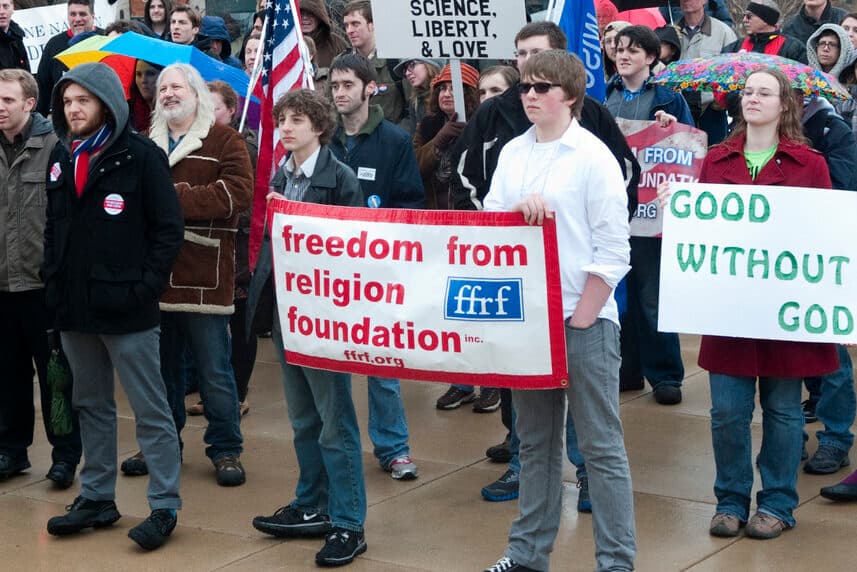An out-of-state anti-religion group recently found itself unsuccessful once again in trying to force a standdown from Alabama universities and leaders for allowing religious activities on campus.
The Freedom From Religion Foundation (FFRF) recently challenged two Alabama universities for faculty participating in religious activities, immediately drawing the ire of state lawmakers and Gov. Kay Ivey.
The FFRF is a Wisconsin-based anti-religion non-profit that sends thousands of complaint letters to school boards, municipalities, counties and executive branch members every year. The complaints and infrequent lawsuits almost always center around alleged violation of the establishment clause of the First Amendment of the U.S. Constitution, which says, “Congress shall make no law respecting an establishment of religion.”
The FFRF has a lengthy history of challenging Alabama schools, universities, political figures and state agencies over perceived religious encroachments into state-related activities. These challenges typically take the form of complaint letters and threatened lawsuits.
More often than not, if the FFRF’s letters are ignored, no subsequent action is taken. The vast majority of FFRF complaint letters never manifest into lawsuits.
In June, pastor Travis Johnson opened the Mobile City Council meeting with a prayer asking God to protect children “inundated and targeted by harmful agendas and social media from peers,” especially when faced with “sexualized merchandizing, conversation and interactions.”
The FFRF sent the Mobile City Council a letter claiming this action was unconstitutional, which the council promptly ignored and continued with regular prayer, incurring nothing further from the FFRF.
The FFRF also complained about prayer over the PA system at a Jefferson County High School football game. The FFRF later claimed Jefferson County Superintendent Walter B. Gonsoulin, Jr. would no longer permit prayer at “school-sponsored events.” Gonsoulin denied the claim, saying it was “simply not correct.” The FFRF took no further legal action.
The FFRF also demanded an investigation after more than a dozen Reeltown High School players were baptized on the field in November 2020. The letter went nowhere after Tallapoosa County Schools Superintendent Joe Windle said he found no wrongdoing
In 2015, the FFRF threatened a lawsuit against Auburn University after the university did not respond to a 2014 public records request related to the FFRF’s complaints over Auburn’s football chaplain position.
According to WSFA, the FFRF sent similar complaint letters to numerous institutions, including the University of Alabama, which did not respond. But FFRF contends Auburn’s silence came even after it cashed a $500 deposit check to cover costs included in the request.
The Auburn complaints fizzled until 2018 when the FFRF sent another complaint letter about Auburn’s football chaplain’s team prayer that was “unmistakably Christian.” By all accounts, the university ignored the complaint.
In 2020, the FFRF sent a letter to Ivey, complaining that she had “promoted Christianity” during a press conference, garnering no response from Ivey.
In 2017, the FFRF also sent a letter claiming Ivey broke the law by posting a video wishing citizens a Merry Christmas, concluding by adding, “May your days ahead be filled with the light of God and his abundant grace.” Again, Ivey did not respond.
Occasionally, however, some local officials capitulate to the FFRF. Most cite the reason for bending to the FFRF’s demands over a fear of a costly legal process.
Last year, the FFRF complained that a Shelby County teacher attempted to proselytize students by sending them home with religious literature. The Shelby County Board of Education later said it had the teacher “review materials emphasizing the importance of separation of church and state.”
In 2015, the Houston County Sheriff’s Office removed “Blessed are the Peacemakers,” a well-known quote from the Gospel of Matthew, from the side of its patrol cars after the FFRF sent a letter.
Also in 2015, Glencoe Mayor Charles Gilchrist removed the long-flying Christian flag from City Hall after the FFRF sent a complaint letter.
In 2019, then-Blount County Sheriff Mark Moon chose not to attend a prayer vigil at a local school after the FFRF sent a complaint letter.
In 2021, the FFRF sued then-Secretary of State John Merrill for the state’s “so help me God” voter oath on its voter registration. The FFRF and Merrill had the suit dropped after Merrill agreed to add an opt-out option to the registration but kept the religious oath. Both parties paid their legal fees.
To connect with the author of this story or to comment, email craig.monger@1819news.com.
Don’t miss out! Subscribe to our newsletter and get our top stories every weekday morning.










